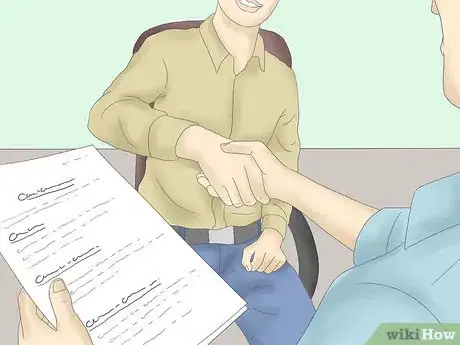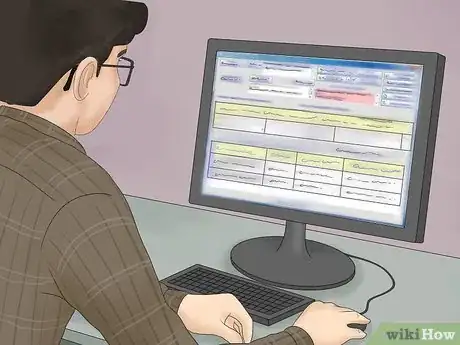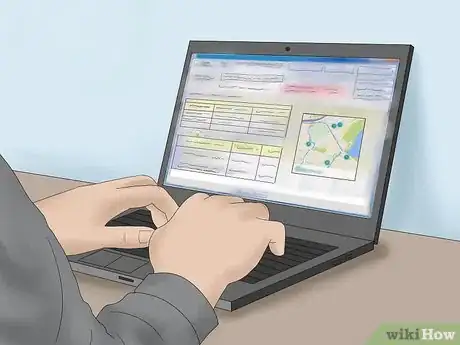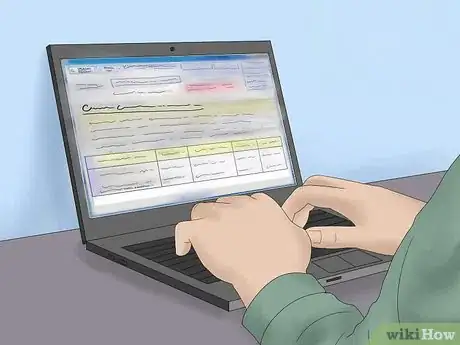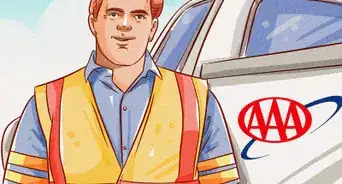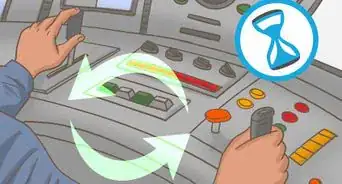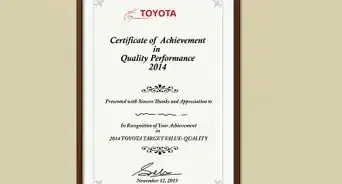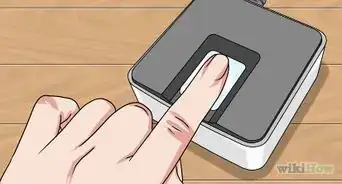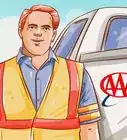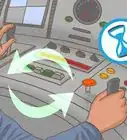This article was co-authored by wikiHow Staff. Our trained team of editors and researchers validate articles for accuracy and comprehensiveness. wikiHow's Content Management Team carefully monitors the work from our editorial staff to ensure that each article is backed by trusted research and meets our high quality standards.
There are 12 references cited in this article, which can be found at the bottom of the page.
wikiHow marks an article as reader-approved once it receives enough positive feedback. In this case, 89% of readers who voted found the article helpful, earning it our reader-approved status.
This article has been viewed 86,328 times.
Learn more...
If you're looking for a fast-paced desk job with little down time, then being a truck dispatcher may be just the position for you. As a truck dispatcher, it would be your job to match truck drivers with loads that need to be picked up and delivered to a client. You'll need strong customer service skills, as you'll be dealing with both the drivers and the clients on a daily basis. To find a position, you may decide you want to move to a better location, but in some cases, you can even work this position from home. Once you're hired, do all you can to become a top truck dispatcher so you have the potential to move up in the company.
Steps
Education and Experience
-
1Graduate from high school or obtain a GED. This job doesn't necessarily require higher education, but you do need at least a high school diploma. You likely won't be considered at all if you don't have a high school diploma or its equivalent.[1]
-
2Enroll in a truck dispatcher course. While you don't need higher education, taking a short course in truck dispatching could give you an edge in the field, though it's optional. You can find courses online to take or look up a course in your area. There are schools specifically for training truck dispatchers.[2]Advertisement
-
3Work on a degree in logistics and transportation. While you don't need a degree for this job, it can help to have an associate's or bachelor's degree in logistics and transportation. Some companies may even require it. Check for schools in your area that offer this degree, or work on an online degree.
-
4Gain experience in the shipping or transportation industry. Often, experience is not necessary for this position, but it certainly doesn't hurt. If you gain experience, you'll be able to learn the state and federal laws that determine load limits and safety regulations. Working in another position in the shipping and trucking industry can help you gain beneficial experience.[3]
-
5Develop customer service skills. A large part of being a truck dispatcher is dealing with customers and their needs. That means you need to develop your customer service skills so that you can assist your customers effectively. You can develop customer service skills in a variety of ways.[4]
- For instance, working retail or even a call center job can help you develop these skills.
- Work on empathy by spending time with people who are different from you. Have conversations where you learn about them and what makes their lives unique.
- You can also try taking an acting class, as that makes you put yourself in other people's shoes.[5]
-
6Work on your communication skills. Communication skills are absolutely essential in this job, as you'll be talking and writing to both customers and drivers throughout the day. You have to be able to say things so that the listener understands what you're saying on the first try if possible.[6]
- When communicating, put the most important information first. List the rest of the information in chronological order if appropriate. Also, be concise and to the point; avoid adding extraneous details.
- The best way to improve your skills is to put these tactics to use in your daily life. Also, make sure you listen carefully when talking to people, and respond to what they're saying instead of just continuing on with what you were saying.
Job Opportunities
-
1Move to a state that pays more for this position. If you're looking to make as much as you can in this position, consider moving to an area that pays more. As of 2016, the areas that paid the highest salaries for truck dispatchers were North Dakota, Illinois, Washington, Alaska, and New York. You can check the statistics for the current year on the website for the U.S. Bureau of Labor Statistics.[7]
-
2Pick a state that hires more dispatchers to help you find a job. Another option is moving to an area that hires the largest number of dispatchers. As of 2016, the states with the highest employment in this position per 1,000 jobs were North Dakota, Alaska, Louisiana, Nevada, and Texas.[8]
-
3Work as truck dispatcher for 1 company. If you want to be a truck dispatcher, you can simply look for a job with a single company. You would apply to that company, and then you would coordinate loads with trucks owned by only that company.[9]
-
4Work from home if you don't want to move. In some cases, you can do this job from the comfort of your own home. Many companies hire remote dispatchers. All you'll need is basic office equipment, such as a computer, a printer, and 2 computer monitors. Usually, you are just hired on by a single company, and you move loads with trucks from that company.[10]
-
5Think about being a freight broker to work for yourself. Another option is moving loads for more than 1 company, in which case you're a property broker/freight broker. For this option, you must register with the Federal Motor Carrier Safety Association and get an active US Department of Transportation number. You can also work under the license of another registered freight broker.[11]
- Once you're registered, you can set up a company and advertise your brokering services.
-
6Search for jobs. You can use major job searching sites, such as Monster, Indeed, and Yahoo!. You can also search for jobs on the websites of major trucking companies and shipping companies. Use words like "truck dispatcher," "shipping dispatcher," and "freight dispatcher" to help find positions.
-
7Customize your resume for these positions. The main traits a hiring manager is looking for are customer service skills, management skills, and calmness in stressful situations. Phone-routing experience is also very helpful. If you have any of these skills, try highlighting them on your resume.[12]
- Also, tailor the application to the job as well, if you're required to fill one out.
-
8Show your skills in the interview. Try to make your points clearly and directly, so you show you can communicate well, for instance. Discuss how other jobs have prepared you well for this job. For instance, if you managed a work scheduling system for other employees at a previous job, that could be something that could transfer to this position, as it requires managing drivers' schedules.
Ways to Improve
-
1Know the software inside and out. Most companies use computer software to help you match loads with trucks to haul them. To be efficient at your job, you need to learn the software as well as you can. You may need to spend some extra hours outside of work fiddling around with it and reading about it, so that when you're on the job, you know exactly what to do.[13]
-
2Learn to stay calm. This job is demanding, and you'll likely be dealing with calls and emails from both your truck drivers and your customers constantly. In other words, you must learn to handle the stress of dealing with people all day, every day in a high-demand job.[14]
- Add some deep breathing tricks to your daily routine. If you find yourself getting stressed, take just a moment or 2 to close your eyes. Breathe in deeply to the count of 4. Hold the breath for 4 counts, and then breathe out to the count of 4. Repeat a few times until you feel yourself calming down.
-
3Build good relationships with your drivers. Your drivers are on the road delivering products while you're coordinating their efforts. It will help things run better if you get to know them and work hard to make things go as smoothly as possible for your drivers. When your drivers are happy, they'll be more willing to go the extra mile when needed. Plus, happy employees are more likely to stick around, and your boss will appreciate you keeping turnover low.[15]
- Make sure you know all your driver's names to start. Also, when your drivers make a request or have a need, do your best to fulfill it or fix the issue to help keep them happy.
-
4Work on using positive language. When working with customers and drivers, certain language will cause the listener to get angry or upset, such as "I don't know," "We can't," or a plain "No." The key is to use phrasing that comes across better to the customer or driver. Rephrase it into positive language to leave the person feeling better about the interaction.[16]
- For instance, instead of saying, "I don't know," you can say, "I need to check with the technician to find that information for you."
- Instead of "No, you can't do that," you could try, "That may not be the best option, but here's something you can try instead."
-
5Listen carefully to what your drivers and customers are saying. When you're working with people, they may not always communicate in the most direct way. That means you need to pay attention to what they're saying underneath their words, which will help you address their needs.[17]
- For instance, maybe you keep hearing drivers say things like "There never seems to be a plan when it comes to routes," or "Why is there another change?" They are essentially saying that they want a better planned schedule, but they're not coming out and saying it directly.
References
- ↑ https://www.payscale.com/research/US/Job=Fleet_Dispatcher_(Trucking_%26_Transportation)/Salary
- ↑ http://www.avaal.com/trucking_dispatch.php
- ↑ https://www.suretybonds.org/blog/how-to-become-a-freight-broker-ultimate-guide/
- ↑ https://www.payscale.com/research/US/Job=Fleet_Dispatcher_(Trucking_%26_Transportation)/Salary
- ↑ https://www.groovehq.com/support/essential-customer-service-skills
- ↑ https://www.groovehq.com/support/essential-customer-service-skills
- ↑ https://www.bls.gov/oes/current/oes435032.htm
- ↑ https://www.bls.gov/oes/current/oes435032.htm
- ↑ https://freightmoversschool.com/classes/truck-dispatcher-training/
- ↑ http://www.heavyhaul.net/heavy-haul-truck-dispatcher-job/
- ↑ https://freightmoversschool.com/classes/truck-dispatcher-training/
- ↑ https://www.payscale.com/research/US/Job=Fleet_Dispatcher_(Trucking_%26_Transportation)/Salary
- ↑ http://www.heavyhaul.net/heavy-haul-truck-dispatcher-job/
- ↑ https://www.evansdist.com/transportation-dispatcher-5-tips/
- ↑ https://www.evansdist.com/transportation-dispatcher-5-tips/
- ↑ https://www.groovehq.com/support/essential-customer-service-skills
- ↑ https://www.helpscout.net/blog/customer-service-skills/
About This Article
Start your career as a truck dispatcher by getting your high school diploma if you don't already have it. Then, enroll in a truck dispatcher course or take college classes in logistics and transportation to make sure you get a good foundation for your career. It can also help if you get experience by working for a shipping or transportation company so you can learn more about the industry. Once you’ve got plenty of experience, find a job as a truck dispatcher or work for yourself as a freight broker. For more tips on becoming a truck dispatcher, like how to work on the skills you need, read on!

